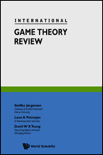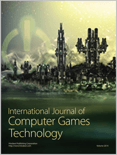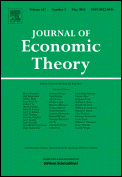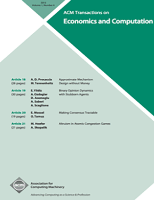
International Game Theory Review
Scope & Guideline
Exploring the Dynamics of Decision-Making
Introduction
Aims and Scopes
- Game Theory Applications in Economics:
The journal extensively covers the application of game theory to economic models, analyzing competitive behaviors, market structures, and policy implications. - Differential Games and Dynamic Models:
A significant focus is on differential games, exploring dynamic interactions among agents over time, particularly in contexts like environmental economics and resource management. - Cooperative and Non-Cooperative Games:
The journal publishes studies on both cooperative game theory, which examines collective strategies and agreements, and non-cooperative games, which focus on individual strategies and outcomes. - Innovative Methodological Approaches:
There is a consistent emphasis on developing new methodologies and computational techniques for solving complex game-theoretic models, including stochastic and dynamic systems. - Interdisciplinary Research:
Research spans various disciplines, indicating a unique contribution to fields such as ecology, healthcare, and public policy, integrating game theory with practical issues.
Trending and Emerging
- Environmental and Ecological Game Theory:
Research focusing on environmental issues and sustainability is on the rise, reflecting global concerns about climate change and resource management, with game theory applied to analyze cooperative strategies for environmental protection. - Technological Innovation and Game Theory:
There is a growing interest in the intersection of game theory and technological innovation, particularly in contexts like clean technology, reflecting a trend towards understanding competitive dynamics in technology-driven markets. - Healthcare and Game Theory Applications:
Emerging themes include the application of game theory to healthcare systems, addressing issues such as resource allocation, pricing strategies, and the dynamics of care provision amid shortages. - Behavioral Game Theory:
The integration of cognitive biases and behavioral insights into game-theoretic models is gaining traction, providing a richer understanding of decision-making processes in competitive environments. - Network Games and Strategic Interactions:
An increasing number of studies are exploring network structures and their impact on game dynamics, emphasizing the importance of connections and relationships in strategic interactions.
Declining or Waning
- Static Game Models:
There has been a noticeable reduction in papers focused on static game models, as researchers increasingly favor dynamic and time-dependent frameworks that better capture real-world scenarios. - Basic Nash Equilibrium Studies:
The foundational studies on Nash equilibria, while still relevant, have become less frequent as the field progresses towards more complex equilibrium concepts and their applications. - Single-Player Control Games:
Research on single-player control games appears to be waning, with a shift towards multi-agent interactions and cooperative strategies that reflect collaborative decision-making. - Traditional Oligopoly Models:
Classic models of oligopoly competition, such as simple Cournot or Bertrand models, are less frequently explored as new models incorporating network effects and environmental concerns gain traction.
Similar Journals

INTERNATIONAL JOURNAL OF GAME THEORY
Decoding the Art of Strategic ThinkingINTERNATIONAL JOURNAL OF GAME THEORY, published by Springer Heidelberg, is a distinguished journal dedicated to the rigorous exploration of game theory across multiple disciplines, encompassing economics, mathematics, social sciences, and statistics. Established in 1971, this journal has become a pivotal resource for scholars and practitioners seeking to deepen their understanding of strategic interactions and decision-making processes. With ISSN 0020-7276 and E-ISSN 1432-1270, the journal spans its focus on theoretical advancements and practical applications in game theory. The journal currently ranks in the Q2 and Q3 quartiles across various categories, reflecting its impact and relevance in the academic community. Although not an open-access journal, it continues to provide invaluable insights for researchers, professionals, and students aiming to advance their knowledge in this critical area of study. The journal's commitment to fostering intellectual discourse is evident through its comprehensive coverage of topics relevant to modern-day challenges, positioning itself as an essential platform in the academic landscape.

International Journal of Computer Games Technology
Unleashing Creativity in Computer Graphics and InteractionInternational Journal of Computer Games Technology, an esteemed publication from HINDAWI LTD, serves as a pivotal platform for scholars and practitioners in the realms of computer graphics, software, and human-computer interaction. Since its inception in 2008 as an open-access journal, it has committed to disseminating cutting-edge research and innovative practices within the gaming technology sector. The journal, identified by its ISSN 1687-7047 and E-ISSN 1687-7055, is based in the United States and boasts a converged publication timeline from 2009 to 2024. Recognized in the 2023 Category Quartiles for its contributions to notable fields, it ranks Q3 in Computer Graphics and Computer-Aided Design, Q4 in Human-Computer Interaction, and Q3 in Software. With its active presence in Scopus rankings, the journal holds commendable positions in multiple categories, indicating a growing impact on the academic community. This journal not only aims to advance knowledge but also encourages collaborative exploration and innovative solutions, making it an essential resource for researchers, professionals, and students dedicated to the evolution of gaming technology.

JOURNAL OF ECONOMIC THEORY
Connecting Scholars through Economic InnovationThe JOURNAL OF ECONOMIC THEORY, published by Academic Press Inc Elsevier Science, stands as a paramount platform for disseminating groundbreaking research within the field of economics and econometrics. With an impressive history dating back to 1969 and a convergence period extending to 2024, this journal has continually shaped the academic discourse around critical economic theories and methodologies. Currently recognized in the top quartile (Q1) of its category for 2023, it ranks prominently among its peers, boasting an impactful scholarly contribution reflected in its Scopus ranking—positioned at #348 out of 716 journals in the domain. Although it does not offer Open Access, the journal provides an essential resource for those seeking to enhance their understanding of complex economic models and strategies. Researchers, professionals, and students alike will find the JOURNAL OF ECONOMIC THEORY to be an invaluable asset for their academic and professional pursuits in the rapidly evolving landscape of economics.

Dynamic Games and Applications
Charting New Territories in Game Theory and ApplicationsDynamic Games and Applications (ISSN: 2153-0785, E-ISSN: 2153-0793) is a premier journal published by SPRINGER BIRKHAUSER that specializes in the field of applied and computational mathematics. With a notable impact factor and a solid standing within the Q2 quartile in several categories including Applied Mathematics and Computational Theory, this journal serves as a vital platform for researchers and practitioners looking to explore dynamic games and their applications across diverse disciplines. Covering a wide range of subjects from computer graphics and economics to advanced statistical methods, Dynamic Games and Applications seeks to publish original research that deepens the understanding of strategies in competitive and cooperative environments. As a crucial resource for academics, industry professionals, and graduate students, the journal not only disseminates innovative findings but also fosters collaboration and interdisciplinary research in an increasingly complex mathematical landscape.

ACM Transactions on Economics and Computation
Advancing Knowledge at the Nexus of Economics and ComputationACM Transactions on Economics and Computation, published by the Association for Computing Machinery, is a premier scholarly journal that bridges the fields of economics and computation. With an ISSN of 2167-8375 and an E-ISSN of 2167-8383, this journal has carved out a significant niche since its inception in 2013, and is set to run through 2024. Its multidisciplinary scope encompasses various quarters, being ranked Q1 in Computer Science (miscellaneous) and Q2 in Computational Mathematics, Economics and Econometrics, Marketing, and Statistics and Probability as of 2023. The journal not only ranks impressively in Scopus—positioned within the top 25% for several categories—but also fosters a collaborative environment where researchers, professionals, and students can engage with cutting-edge research that showcases innovative methodologies and theoretical advancements. Although it is not open access, the journal remains vital for advancing knowledge at the intersection of computation and economics, making it an essential resource for those looking to understand the complexities of these dynamic fields.

ECONOMIC INQUIRY
Navigating the Complexities of Economics and Management.ECONOMIC INQUIRY, published by Wiley, is a prestigious academic journal that has been at the forefront of research in economics and management since its inception in 1962. With an ISSN of 0095-2583 and an E-ISSN of 1465-7295, this journal is renowned for its rigorous peer-reviewed articles, embracing a wide scope of economic and econometric inquiries. Its impressive placement in the Q1 category for both Business, Management and Accounting, and Economics and Econometrics highlights its significance within these fields. With a Scopus rank placing it in the top quartile of Economics and Econometrics journals, alongside a ranking for Business studies, it caters to a diverse audience of researchers, professionals, and students eager to deepen their understanding of economic phenomena. Although it operates under a traditional subscription model and does not offer open access, the journal's contributions are instrumental in advancing knowledge and discourse in economic theory and practice, making it an essential resource for anyone involved in this vibrant discipline.

ICGA JOURNAL
Fostering dialogue in the realm of computer science.Welcome to the ICGA Journal, an esteemed publication by IOS Press, dedicated to advancing the field of computational and algorithmic research within computer science. Established with the ambition of fostering innovative dialogue among researchers, this journal focuses on diverse areas such as computer graphics, human-computer interaction, and computational mechanics. Despite undergoing some changes over the years, including its coverage discontinuation in Scopus, the ICGA Journal remains a pivotal resource for professionals and students alike, offering insights into cutting-edge research and methodologies. With a rich history spanning from 2005 to 2015 and in 2017, it continues to be a platform for scholarly exchange, striving to elevate the discourse in the field. Explore the journal's vision through its open access options that promote knowledge dissemination and accessibility among the global research community.

Games
Transforming Perspectives on Games with Cutting-Edge Scholarship.Games, published by MDPI, is an influential open-access journal launched in 2010 that explores the multifaceted realm of games through the lenses of applied mathematics, statistics, and decision sciences. Hailing from Switzerland, this journal has developed a unique position in the academic landscape, focusing on innovative research that examines theoretical and practical implications of games in various contexts. With an impressive convergence of literature from 2010 to 2024 and an evolving scope that aligns with contemporary research trends, Games has achieved a respectable ranking in its respective categories, including Q3 in Applied Mathematics and Statistics. Offering rapid publication and a commitment to accessibility, the journal invites researchers, professionals, and students to contribute and engage with groundbreaking findings that push the boundaries of game theory, analytics, and their applications. With an increasing interest in game-based learning and gamification across disciplines, Games is essential reading for anyone looking to explore the mathematical and probabilistic facets of this dynamic field.

JOURNAL OF OPTIMIZATION THEORY AND APPLICATIONS
Exploring New Dimensions in Applied MathematicsJOURNAL OF OPTIMIZATION THEORY AND APPLICATIONS, published by Springer/Plenum Publishers, is a prestigious academic journal that has been at the forefront of the fields of applied mathematics, control and optimization, and management science since its inception in 1967. With an ISSN number of 0022-3239 and an E-ISSN of 1573-2878, it is recognized for its rigorous peer-reviewed content and aims to provide a platform for the dissemination of research that advances theoretical frameworks and practical applications in optimization. As of 2023, the journal holds an impressive Q1 ranking in both Applied Mathematics and Control and Optimization, showcasing its impact and influence in these domains. The journal is also highly ranked in the realm of management science and operations research, making it a vital resource for academics, professionals, and students alike. Though it does not currently offer open access, the journal's articles are widely accessible through institutional subscriptions. Significantly, its long-standing commitment to scholarly excellence positions it as a key player in fostering innovative research and discussions that impact various real-world challenges in optimization.

REVUE ECONOMIQUE
Advancing Knowledge in Economics and FinanceREVUE ECONOMIQUE, published by PRESSES FOND NAT SCI POLIT in France, is a distinguished academic journal with an ISSN of 0035-2764 and an E-ISSN of 1950-6694. Established in 1974, the journal has evolved significantly over the years, focusing on a diverse range of topics within the field of economics, econometrics, and finance. With its commitment to presenting in-depth research and innovative perspectives, REVUE ECONOMIQUE serves as a vital resource for scholars, professionals, and students seeking to enhance their understanding of economic theories and practices. Although it is currently categorized in the Q4 quartile, ranking 241 out of 288 in the field, the journal aims to foster new dialogues and disseminate valuable insights that contribute to the economic discourse. The journal is not available as open access, but its rich repository of articles continues to attract readers interested in the complexities of economic dynamics. For more information, you can refer to their address at 27 RUE SAINT-GUILLAUME, 75341 PARIS 07, FRANCE.